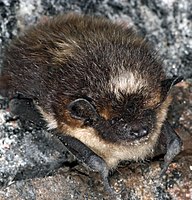
Photo from wikipedia
Mammalian hibernators undergo major behavioural, physiological and biochemical changes to survive hypothermia, ischaemia-reperfusion and finite fuel reserves during days or weeks of continuous torpor. During hibernation, the 13-lined ground squirrel… Click to show full abstract
Mammalian hibernators undergo major behavioural, physiological and biochemical changes to survive hypothermia, ischaemia-reperfusion and finite fuel reserves during days or weeks of continuous torpor. During hibernation, the 13-lined ground squirrel (Ictidomys tridecemlineatus) undergoes a global suppression of energetically expensive processes such as transcription and translation, while selectively upregulating certain genes/proteins to mitigate torpor-related damage. Antioxidant defenses are critical for preventing damage caused by reactive oxygen species (ROS) during torpor and arousal, and Nrf2 is a critical regulator of these antioxidant genes. This study analysed the relative protein expression levels of Nrf2, KEAP1, small Mafs (MafF, MafK and MafG) and catalase and the regulation of Nrf2 transcription factors by post-translational modifications (PTMs) and protein-protein interactions with a negative regulator (KEAP1) during hibernation. It was found that a significant increase in MafK during late torpor predicated an increase in relative Nrf2 and catalase levels seen in arousal. Additionally, Nrf2-KEAP1 protein-protein interactions and Nrf2 PTMs, including serine phosphorylation and lysine acetylation, were responsive to cycles of torpor-arousal with peak responses occurring during arousal. These peaks seen during arousal correspond to a surge in oxygen consumption, which causes increased ROS production. Thus, these regulatory mechanisms could be important during hibernation because they provide mechanisms for mitigating the deleterious effects of oxidative stress by modifying Nrf2 expression and function in an energetically inexpensive manner.
Journal Title: Cell biochemistry and function
Year Published: 2021
Link to full text (if available)
Share on Social Media: Sign Up to like & get
recommendations!